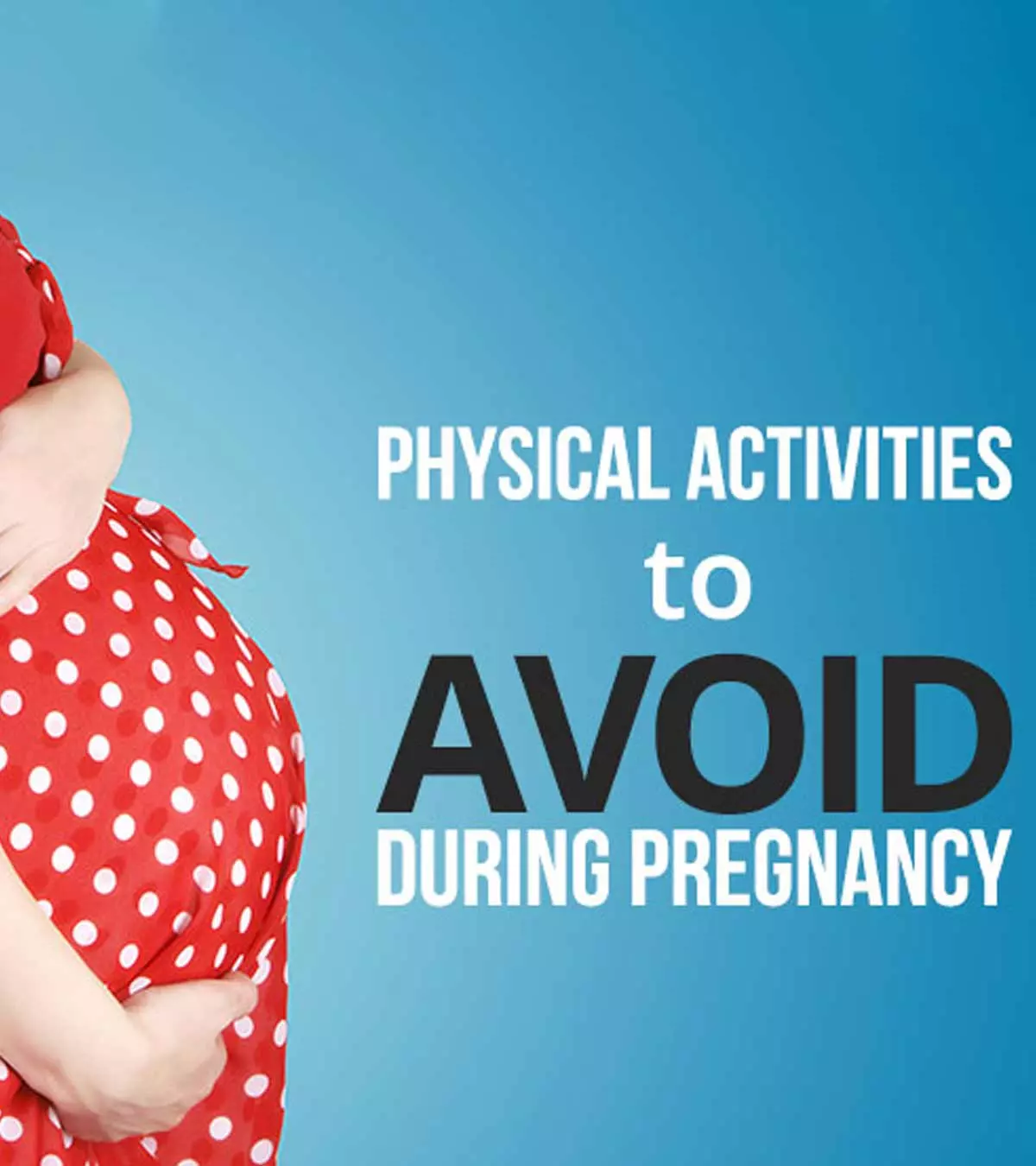

Image: Shutterstock
During pregnancy, most women are extra cautious about their diet and lifestyle, and for a good reason. Hence, you should be aware of the activities to avoid when pregnant since they may harm your baby or give rise to complications.
While you can carry out your daily routine while pregnant without making too many changes, some alterations are required based on how safe the activities are for your baby. For example, doing heavy exercises, bending forward frequently, and lifting heavy objects are some activities that should be avoided.
Read on to know more about the activities you should avoid doing while pregnant.
Physical Activities To Avoid During Pregnancy
Exercises and light activities ready your body for the ordeal of delivery. However, there are some activities to avoid while pregnant in order to ensure your baby’s safety. Confused? Read on to know.
1. Heavyweight training
Lifting heavy weights can strain your back and pelvis. It can also lead to leaking and increases the chances of prolapse (uterus slips into the vagina) (2). If you have to lift anything heavy, try to hold it close to your body. Slowly bend your knees and do not involve the back or twist while lifting. If you have had a miscarriage in the past, you must refrain from weight training.
2. Certain types of yoga
Yoga is a wonderful practice, but some positions that require a lot of stretching and twisting should be avoided. Closed twists, belly down postures, full inversions, and backbends are a few to avoid. Whether you are new to yoga or a seasoned practitioner, you have to consult your doctor before doing it during pregnancy. You may attend a prenatal yoga class, which is specifically designed for pregnant women.
3. Do not exercise lying on your back
Avoid exercises that require you to lie on your back for long hours. When you lie on your back, the expanding uterus exerts pressure on the main vein that brings blood back to the heart. It may cause a problem with your blood pressure (2).
4. Sauna bath or hot tubs
Relaxing in the hot bathtub can be dangerous as it can increase the chances of birth defects and also infectious ailments if the water or the tub is not clean. The water temperature used for bathing should be close to your body temperature (3).
5. Amusement rides
Amusement park rides are a big no-no during pregnancy. If you are prone to nausea, you must avoid anything that goes in a circular or vertical motion in the air. Avoid roller-coaster and such rides as they require a forceful take off and landing, which can harm your baby (4) .
6. Running and jogging
Running and jogging are good for you only if you have been in a habit. Do not start a fresh running or jogging routine. Try to walk rather than run or jog, as you have better control over your speed and have fewer chances of injury.
7. Cycling
Cycling is not a good idea for expectant moms. Experienced riders may continue until their second trimester. But as the pregnancy progresses, the center of balance shifts making cycling difficult. Also, riding in crowded roads and lone pathways may not be safe. A safer alternative is riding a stationary bike (6).
8. High impact aerobics
They increase the likeliness of falling and injuring joints and ligaments that balance your body. Even if you have an experience in aerobics, you should avoid it in second and third trimesters. The ligaments tend to become loose and are more susceptible to injury.
9. Rigorous work
Pregnancy is a time to take things easy. If you wish to exercise, do it at home or a nearby gym. Indulge in only light exercises and with the air condition on. Ensure that your heart rate is below 140 beats per minute and the temperature below 102 degrees. If you begin feeling exhausted, then listen to your body and stop and take rest.
10. Downhill skiing and snowboarding
You must avoid downhill skiing and snowboarding as you may lose body balance and suffer from severe falls and injuries. If you want to ski, you may choose gentle slopes.
11. Scuba diving, surfing, and water-skiing
When you surface over waters, there are chances for air bubbles to form in your bloodstream putting you and your baby at risk. Also, surfing and water-skiing can increase the risk of falls and injury. The decompression during scuba diving could adversely affect the baby (7).
12. Tennis
Even if you are a regular tennis player, you may have to avoid playing tennis during pregnancy as your body’s balance changes and you could have a fall and injure yourself.
13. Horseback riding
It is a highly dangerous activity during pregnancy. There is the risk of falls, and, you can never predict how a wild horse might react (8).
Light and medically-approved physical activities are recommended during pregnancy to strengthen your muscles and prepare you for labor. Weight training, running, or high-intensity aerobics are a few activities to avoid while pregnant as they may strain the muscles. Such strenuous activities may also increase the risk of an injury. Hence, try to keep the activities on the low-intensity radar while pregnant. Consult your gynecologist to know which activities suit you the most.
References
- What Is Pelvic Organ Prolapse.
https://nafc.org/pelvic-organ-prolapse/ - Exercise During Pregnancy.
https://www.acog.org/womens-health/faqs/exercise-during-pregnancy - AJ Agopian et al; (2013); A case–control study of maternal bathing habits and risk for birth defects in offspring.
https://www.ncbi.nlm.nih.gov/pmc/articles/PMC4015781/ - Roller Coasters While Pregnant.
https://americanpregnancy.org/healthy-pregnancy/is-it-safe/roller-coasters-while-pregnant/ - Running in pregnancy.
https://www.tommys.org/pregnancy-information/im-pregnant/exercise-in-pregnancy/running-pregnancy - Exercise and Pregnancy.
https://americanpregnancy.org/healthy-pregnancy/pregnancy-health-wellness/exercise-and-pregnancy/ - Pregnancy and Diving.
https://dan.org/health-medicine/health-resources/diseases-conditions/pregnancy-and-diving/ - Horse riding while pregnant.
https://inside.fei.org/fei/your-role/medical-safety/pregnancy
Community Experiences
Join the conversation and become a part of our nurturing community! Share your stories, experiences, and insights to connect with fellow parents.
Read full bio of Dr. Shweta Goswami
Read full bio of Rebecca Malachi














